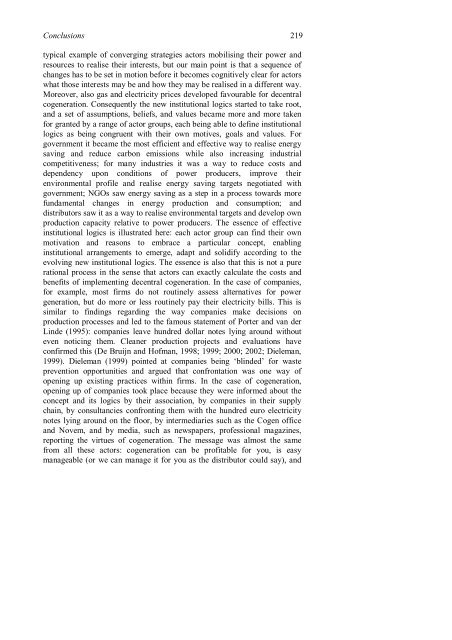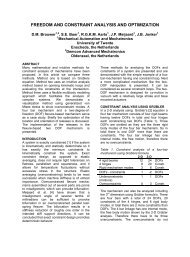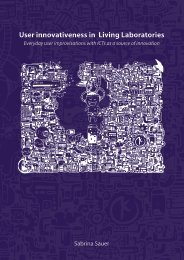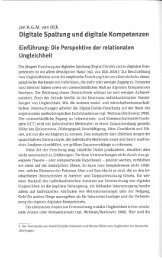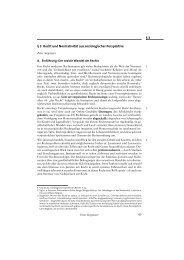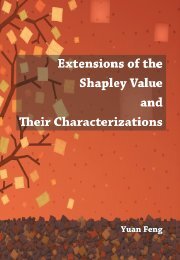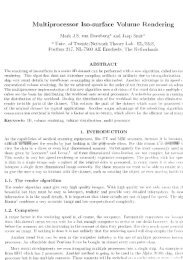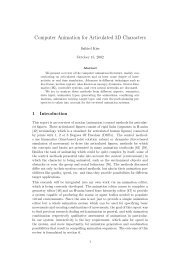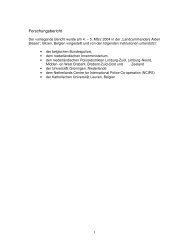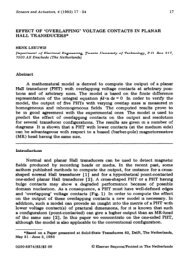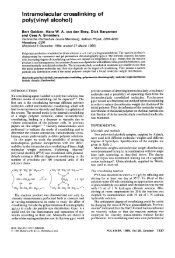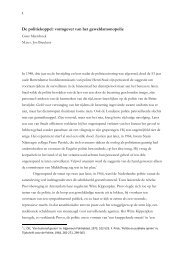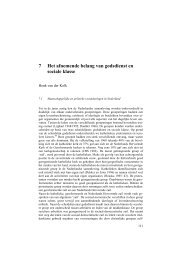Innovation and institutional change: the transition to a sustainable ...
Innovation and institutional change: the transition to a sustainable ...
Innovation and institutional change: the transition to a sustainable ...
Create successful ePaper yourself
Turn your PDF publications into a flip-book with our unique Google optimized e-Paper software.
Conclusions 219<br />
typical example of converging strategies ac<strong>to</strong>rs mobilising <strong>the</strong>ir power <strong>and</strong><br />
resources <strong>to</strong> realise <strong>the</strong>ir interests, but our main point is that a sequence of<br />
<strong>change</strong>s has <strong>to</strong> be set in motion before it becomes cognitively clear for ac<strong>to</strong>rs<br />
what those interests may be <strong>and</strong> how <strong>the</strong>y may be realised in a different way.<br />
Moreover, also gas <strong>and</strong> electricity prices developed favourable for decentral<br />
cogeneration. Consequently <strong>the</strong> new <strong>institutional</strong> logics started <strong>to</strong> take root,<br />
<strong>and</strong> a set of assumptions, beliefs, <strong>and</strong> values became more <strong>and</strong> more taken<br />
for granted by a range of ac<strong>to</strong>r groups, each being able <strong>to</strong> define <strong>institutional</strong><br />
logics as being congruent with <strong>the</strong>ir own motives, goals <strong>and</strong> values. For<br />
government it became <strong>the</strong> most efficient <strong>and</strong> effective way <strong>to</strong> realise energy<br />
saving <strong>and</strong> reduce carbon emissions while also increasing industrial<br />
competitiveness; for many industries it was a way <strong>to</strong> reduce costs <strong>and</strong><br />
dependency upon conditions of power producers, improve <strong>the</strong>ir<br />
environmental profile <strong>and</strong> realise energy saving targets negotiated with<br />
government; NGOs saw energy saving as a step in a process <strong>to</strong>wards more<br />
fundamental <strong>change</strong>s in energy production <strong>and</strong> consumption; <strong>and</strong><br />
distribu<strong>to</strong>rs saw it as a way <strong>to</strong> realise environmental targets <strong>and</strong> develop own<br />
production capacity relative <strong>to</strong> power producers. The essence of effective<br />
<strong>institutional</strong> logics is illustrated here: each ac<strong>to</strong>r group can find <strong>the</strong>ir own<br />
motivation <strong>and</strong> reasons <strong>to</strong> embrace a particular concept, enabling<br />
<strong>institutional</strong> arrangements <strong>to</strong> emerge, adapt <strong>and</strong> solidify according <strong>to</strong> <strong>the</strong><br />
evolving new <strong>institutional</strong> logics. The essence is also that this is not a pure<br />
rational process in <strong>the</strong> sense that ac<strong>to</strong>rs can exactly calculate <strong>the</strong> costs <strong>and</strong><br />
benefits of implementing decentral cogeneration. In <strong>the</strong> case of companies,<br />
for example, most firms do not routinely assess alternatives for power<br />
generation, but do more or less routinely pay <strong>the</strong>ir electricity bills. This is<br />
similar <strong>to</strong> findings regarding <strong>the</strong> way companies make decisions on<br />
production processes <strong>and</strong> led <strong>to</strong> <strong>the</strong> famous statement of Porter <strong>and</strong> van der<br />
Linde (1995): companies leave hundred dollar notes lying around without<br />
even noticing <strong>the</strong>m. Cleaner production projects <strong>and</strong> evaluations have<br />
confirmed this (De Bruijn <strong>and</strong> Hofman, 1998; 1999; 2000; 2002; Dieleman,<br />
1999). Dieleman (1999) pointed at companies being ‘blinded’ for waste<br />
prevention opportunities <strong>and</strong> argued that confrontation was one way of<br />
opening up existing practices within firms. In <strong>the</strong> case of cogeneration,<br />
opening up of companies <strong>to</strong>ok place because <strong>the</strong>y were informed about <strong>the</strong><br />
concept <strong>and</strong> its logics by <strong>the</strong>ir association, by companies in <strong>the</strong>ir supply<br />
chain, by consultancies confronting <strong>the</strong>m with <strong>the</strong> hundred euro electricity<br />
notes lying around on <strong>the</strong> floor, by intermediaries such as <strong>the</strong> Cogen office<br />
<strong>and</strong> Novem, <strong>and</strong> by media, such as newspapers, professional magazines,<br />
reporting <strong>the</strong> virtues of cogeneration. The message was almost <strong>the</strong> same<br />
from all <strong>the</strong>se ac<strong>to</strong>rs: cogeneration can be profitable for you, is easy<br />
manageable (or we can manage it for you as <strong>the</strong> distribu<strong>to</strong>r could say), <strong>and</strong>


